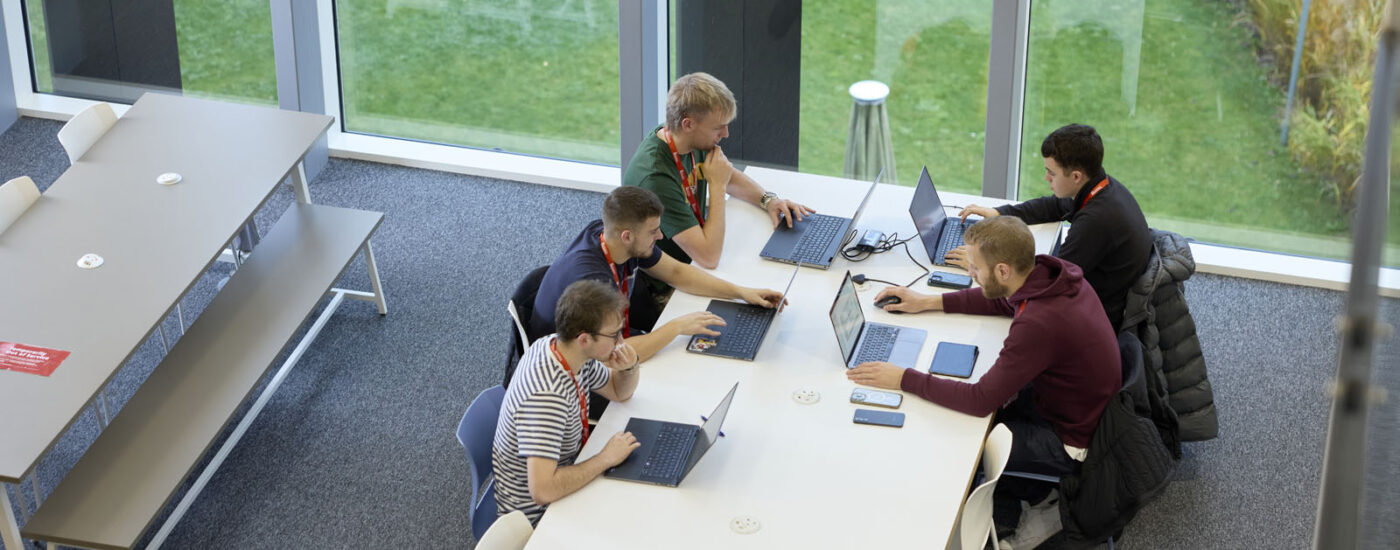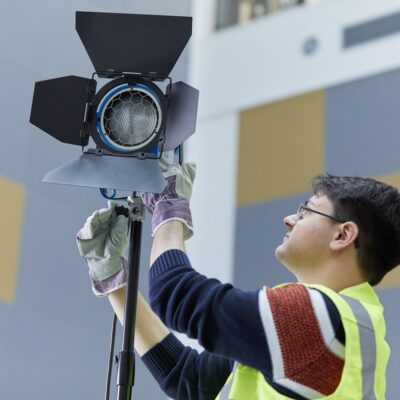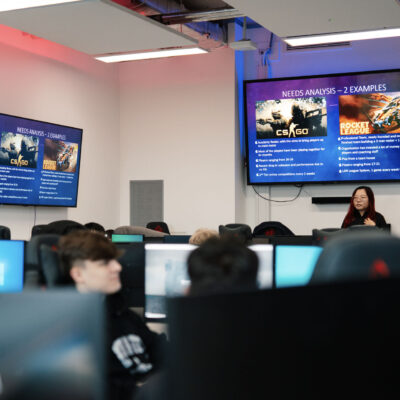Senior Lecturer in Journalism & Media
Faculty of Arts, Science and Technology

Multimedia Journalism BA (Hons)
- Home
- Courses by subject
- Multimedia Journalism BA (Hons)
Key Facts
-
UCAS Code
BA: P500
BA with Foundation: P501 -
Level
UndergraduateUG BA (Hons)
-
Duration
Full Time: 3 years
Full Time Foundation: 4 years
Part Time: 4 - 6 years -
Starting
September
-
BCC at A-Level or,
DMM at BTEC -
Full Time: £9,535
Part Time: £1,585 (per 20 credits)
Integrated Foundation Year: £9,535 -
Full Time: £15,700
Integrated Foundation Year: £15,700 -
Waterside
Updated 09/04/2025
Updated 09/04/2025
Get in touch
For questions regarding study and admissions please contact us:
UK STUDENTS ENQUIRIES
study@northampton.ac.uk
0300 303 2772
INTERNATIONAL STUDENTS ENQUIRIES
You begin Multimedia Journalism BA (Hons) by learning the core skills and knowledge you need to work as a journalist. You rapidly move on to producing your own news, honing your writing and editing skills whilst deepening your knowledge of the law, ethics and professional practice of journalism today.
Each year on our journalism degree, you develop your skills further across a range of platforms and in your final year, you will be producing major pieces of both journalistic and academic work with which to launch you into your journalism career.
The University of Northampton’s Multimedia Journalism programme is accredited by the Broadcast Journalism Training Council.
The BJTC is a partnership between universities and the top broadcasters such as the BBC, Sky, ITN, Global Radio and more. When you graduate from us, you are also eligible for a BJTC skills certificate which will help as you apply for jobs.
This multimedia journalism degree course will open a range of career opportunities, in journalism, public relations and the wider media industry. Typical starter jobs include reporters, broadcast assistants, video content managers and producers. Graduates from Multimedia Journalism BA (Hons) have worked for the BBC, BT Sport, LBC, Sky News, ventured into public relations or have gone on to master’s study.
Highlights
-
- Newsroom, television and radio studios with all the software you need
- Volunteer on our own community radio station, NLive. You can present your own show, read the news or produce behind the scenes – including on Election Night
- Gain experience covering national and international events, such as the Coronation of King Charles III, Commonwealth Games 2022 and World Cup 2022.
- Multimedia Journalism degree accredited by the Broadcast Journalism Training Council.
- Learn from former and practising journalists
- Develop a portfolio of published work during the journalist degree to show employers
- Complete a minimum of 15 days on journalism placement
- Guaranteed paid internship with the Northampton Employment Promise.
- HP laptop and software included with this course for eligible students* (*see Eligibility criteria and Terms and Conditions)
Entry Requirements
A typical offer for Multimedia Journalism is:
- BCC at A-Level or,
- DMM at BTEC/Cambridge Technical or,
- Pass (C and above) at T Level
You will be expected to have achieved GCSE Mathematics and English (or equivalent) at grade C/4 or above.
-
We welcome international applications and applications from students with a range of non-traditional educational or professional qualifications who have an active interest in the study and practice of journalism.
We welcome applications from students with a mix of A levels and BTEC/Cambridge Technical qualifications. For more more information on how to make an application, please visit our How to Apply page.
If you are an International student and would like information on making an application for this journalism degree, please see our How to Apply page.
-
Any students joining with advanced standing in L5 (Year 2) or L6 (Year 3) will be awarded BA (Hons) Journalism (without BJTC accreditation) rather than BA (Hons) Multimedia Journalism. If the programme team feels that a student in this position was still eligible for the accredited BA Multimedia Journalism award title (based on modules studied at a previous institution) then this would need to be documented and approved. We envisage that this would only be relevant in specific circumstances (e.g. a student transferring from a BJTC accredited degree course at a different institution at the end of L4). It would not be relevant for any international/partner students coming in at L6. The modules studied for the non-accredited BA Journalism award would be the same as those for the accredited BA Multimedia Journalism.
-
Admission to this foundation multimedia course is normally:
- DEE at A-Level or,
- MPP at BTEC or,
- Pass (D or E) at T Level
However, we would also like to hear from you if you have professional or industry experience, a range of other qualifications or self-developed subject knowledge that relates to the programme you wish to study.
-
In order to meet accreditation rules, all International and EU students studying this course must achieve the following minimum English language requirements:
- IELTS 7.5 (or equivalent) with a minimum of 7.5 in all bands
They may be able to work towards this whilst doing the course, following referral to the course tutor for consideration.
For information regarding English language requirements at the University of Northampton, please see our IELTS page.
Worried about student finance?
Get all the info you need ahead of time, before you can apply for funding in Spring on our fees and funding pages.
Course Content
-
You often learn best when you are doing – and on University of Northampton’s Multimedia Journalism course you will have plenty to keep you busy. Read more about our modules below and watch this short video of Multimedia Journalism students covering the 2024 General Election:
Year 1
- News skills: the practical skills you need to produce online radio and television news, learning in our newsroom and in our radio and television studios.
- Newswriting: this is such an important skill in multimedia journalism. You learn how to write stories for different platforms clearly and concisely
- History and ethics of journalism: you need to understand how the industry has developed and you look at the key controversies
- Law and public affairs: nobody wants to be sued. You learn how to produce legally safe articles. And you learn how to learn power to account.
Year 2
You develop your broadcast skills and learn both digital and design skills, making your own websites and magazines.
You deepen your knowledge of law and media regulation and examine media theory.
The highlight of Year 2 is your 15 newsdays where you go out, find the news and produce your own news programmes and content.
Year 3
In your final year of the journalism degree, you produce a major practical project, typically a television or radio documentary or a magazine. Past students have won awards for their projects which helped them secure jobs.
You round off your legal training, examine media across the world, examine future trends in journalism and complete a dissertation and get yourself ready for the world of work in a special launchpad module.
During your studies, you will also complete at least 15 days of work placement.
You are assessed through a mixture of practical work, essays and examinations with a dissertation in your final year.
Please note the modules shown here relate to the academic year 24/25. The modules relating to the academic year 25/26 will be available from June 2025.
-
-
Storytelling for News (20 Credits)
Module code: JOU1021Status: CompulsoryThe purpose of this module is The purpose of this module is to introduce learners to non-fiction storytelling, developing their skills and building confidence in writing across a variety of styles including news, comment and features.
-
Law and Public Affairs for Journalists (20 Credits)
Module code: JOU1022Status: CompulsoryThe purpose of this module is lay the groundwork for students? ability to newsgather important public interest stories effectively and legally safely. It covers the key civic structures for the UK and the essential elements of media law.
-
Reporting Power
Module code: JOU1023Status: Compulsory
-
Newsgathering Skills
Module code: JOU1025Status: Compulsory
-
News Production Skills
Module code: JOU1026Status: Compulsory
-
Journalism Now (20 Credits)
Module code: JOU1030Status: CompulsoryThe purpose of this module is to equip students with an understanding of the contemporary practice of multimedia journalism, by examining the current models of communication with reference to its origins, context and likely development. Through an examination of practice, past and present, you will learn to understand the ethical challenges and practices of journalism now. The module will look at evolving modes of communication, the business models that need to keep them stable and their impact on society.
-
Storytelling for News (20 Credits)
-
-
Design Skills for Journalists (20 Credits)
Module code: JOU2018Status: CompulsoryThe purpose of this module is to develop students? skills in hands-on page design, layout, sub-editing and proofreading, as well as associated content management. Students will be using industry-standard graphic design and publishing software to produce their own individual magazine or newspaper project.
-
Digital Skills for Journalists (20 Credits)
Module code: JOU2019Status: CompulsoryThe purpose of this module is to develop awareness of digital toolsets and critical thinking on development of content on digital platforms. Students will enhance their analytical and teambuilding skills by devising and delivering a digital service to a defined target market.
-
Law and Regulation for Journalists (20 Credits)
Module code: JOU2020Status: CompulsoryThe purpose of this module is to analyse the legal and regulatory framework under which a journalist operates and learn to apply it in content creation scenarios. Students will apply their knowledge through exercises in multiplatform court reporting and enhance their knowledge of regulation, which governs published and broadcast material.
-
Broadcast Skills (Newsdays 1) (20 Credits)
Module code: JOU2025Status: CompulsoryThe purpose of this module is for students to develop their professional journalistic skills in research, newsgathering and reporting relevant to broadcast and on-line digital news production. This module will serve as the preparatory upskilling module for the Semester 2 module JOU2026 News Days when students will report on the news in a near-professional work environment, with a specific deadline.
-
Newsdays (2)
Module code: JOU2026Status: Compulsory
-
Academic and Journalism Long Form Skills
Module code: JOU2027Status: Compulsory
-
Design Skills for Journalists (20 Credits)
-
-
Law and International Media Regulation (20 Credits)
Module code: JOU3001Status: CompulsoryThis module will add to students' legal knowledge and relate that study to an examination of how the media is regulated in the UK and globally. This will include the rights of journalists, protection of journalists, and the role played by trade unions and campaigning organisations.
-
Journalism Practical Project (20 Credits)
Module code: JOU3002Status: CompulsoryThe purpose of this module is to facilitate independent creative and critical work in a specified area of journalistic production. It requires students to initiate, discuss and negotiate a body of work for the year, and then to take responsibility for the successful completion of that work to deadline.
-
LAUNCHPAD: Careers in Journalism (20 Credits)
Module code: JOU3003Status: CompulsoryThis module prompts students to consider a specific role or function within journalism, and to investigate how this might become a future career path. Teaching and learning requires students to research and critically reflect on the structure of the sector and their personal intentions and professional development.
-
Multiplatform Journalism (20 Credits)
Module code: JOU3019Status: CompulsoryThis module is the principal module for Multimedia Journalism students. The focus is on establishing and managing a local journalism newsroom with outputs on digital, radio and television. Students will submit a portfolio providing evidence of their journalistic contributions during the period of the project.
-
Future Trends in Journalism (20 Credits)
Module code: JOU3020Status: CompulsoryThe purpose of this module is to examine the development of future trends in journalism. Journalism has undergone several waves of significant change, such as the emergence of digital journalism, social media, and data journalism, this module aims to critically examine those changes and critique emerging future trends.
-
Journalism Dissertation (20 Credits)
Module code: JOU4001Status: CompulsoryThe purpose of this module is to provide an opportunity for students to develop, at length, a particular disciplinary interest. This may derive either from study in the first two years of the degree, or from reading and/or practice activities on their own initiative.
-
Law and International Media Regulation (20 Credits)
-
At the University of Northampton, everything we do, from funded trips to paid internships, is to give you everything you need to make a difference when you leave.
If you join this full-time Multimedia course at the University of Northampton, you will receive a laptop when your course begins*. The laptops are built to a bespoke custom specification ideal for use in the seminar room, collaborative group work or studying at home.
Whatever your ambitions, we’re here to help you to achieve them. We’ll support you to identify the skills you’re learning during your course, find your strengths and secure practical experience so that when it comes to applying for jobs or further study you’ll feel confident in standing out from the crowd. We’ve created the Northampton Employment Promise because we are so confident that if you focus on your studies and complete one of our awards you’ll be highly employable by the time you graduate. Putting you in a great position to secure employment or continue your studies.
To check out the full list of perks, visit our Student Perks page or dedicated International Perks page.
*UK fee payers only (see Terms and Conditions for further details).
-
The Integrated Foundation Year (IFY) offers a new and exciting route into studying for a journalism degree, attracting ambitious and driven students who are willing to learn and advance.
If you have non-standard qualifications or do not quite meet the admissions requirements we can offer you a fantastic opportunity to study a four year programme which includes an Integrated Foundation Year. The Integrated Foundation Year will help you develop the theoretical/practical and academic skills you need, in order to successfully progress to the full award.
Our four-year courses will enable you to successfully follow the degree pathway of your choice while gaining essential study skills. The foundation year of your chosen degree will be studied on a full-time basis and is aimed at supporting the transition to higher education. Years two, three and four are then studied as a standard degree programme.
-
How will I be taught on Multimedia Journalism BA (Hons)?
For this journalism course, your taught study will be a combination of lectures, seminars and workshops, both face to face and online through blended learning.
Will I have the opportunity to go on study trips?
Yes, we look out for great extracurricular opportunities. In 2019/2020, students went to Berlin to report the anniversary of the fall of the Berlin Wall. You can see them in action here on the inspiring trip to Berlin.
Are there any specialist facilities and features of the Multimedia Journalism degree?
The course has its own:
- dedicated room for the creation of print, audio and video artefacts
- dedicated newsroom
- digitally equipped radio and television studios.
- professional voice training
- master classes with industry practitioners
Do you have any award-winning students?
We are immensely proud of our award-winning students. One third of our students who graduated in July 2019 either won or were highly commended in national or regional awards.
Kirk Asiedu won the Broadcast Journalism Training Council’s award for the best radio documentary and their overall award for journalism excellence for his practical project on dementia care in the UK and Ghana. Kirk now has a flourishing career in broadcast journalism.
Student Story
Kirk Asiedu is set for bright future after winning top journalism award
Fees and Funding
2025/26 Tuition Fees
- UK Full Time: £9,535
- UK Part Time: £1,585 per 20 credit module
- UK Integrated Foundation Year: £9,535 for the foundation year; thereafter standard fees apply
- International Full Time: £15,700
- International Integrated Foundation Year: £15,700 for the foundation year; thereafter standard fees apply
Fees quoted relate to study in the Academic Year 2025/26 only and may be subject to inflationary increases in future years. UON will adjust UK fees annually in line with Government Policy.
-
- printing costs: £50+ per year
- external hard drive to store material: £50
- travel on Newsdays to stories: No more than £50
Optional
Subscription to Adobe Creative Cloud. This will give you access to creative tools at home and costs £15 per month. -
For information on the scholarships available to you, please see our scholarships page.
For more information about possible funding options, please visit our Fees and Funding pages.
-
Fees quoted relate to study in the Academic Year 24/25 only and may be subject to inflationary increases in future years.
- UK – Full Time: £9,250
- UK – Part Time: £1,540 per 20 credit module
- UK – Integrated Foundation Year: £9,250
- International – Full Time: £15,200
- International – Integrated Foundation Year: £15,200
Staff

Senior Lecturer in Journalism and Broadcast Journalism
Faculty of Arts, Science and Technology
Hilary Scott

Senior Lecturer in Journalism and Broadcast Journalism
Faculty of Arts, Science and Technology
Hilary Scott

Senior Lecturer in Journalism and Broadcast Journalism
Faculty of Arts, Science and Technology
Hilary Scott
Careers and Employability
This course will open up a range of career opportunities, in journalism, public relations and the wider media industry. Typical starter jobs include reporters, broadcast assistants, video content managers and producers
Graduates from Multimedia Journalism have gone on to work for the BBC, BT Sport, LBC, Sky News and into public relations or have gone on to master’s study.

Related Courses

Creative Film, Television and Digital Media Production BA (Hons)
Explore media production through masterclasses with industry practitioners and benefit from broadcast recording equipment and editing...

Multimedia Sports Journalism BA (Hons)
This course aims to make graduates match-fit for the growing employment areas of sports journalism, broadcasting,...

English BA (Hons)
This dynamic and diverse BA English course provides a thorough exploration of English Literature from the...

Esports BSc (Hons)
As an esports BSc (Hons) student, you will study disciplines around competitive live and on-line video...

